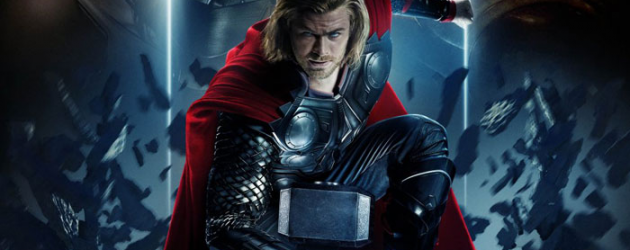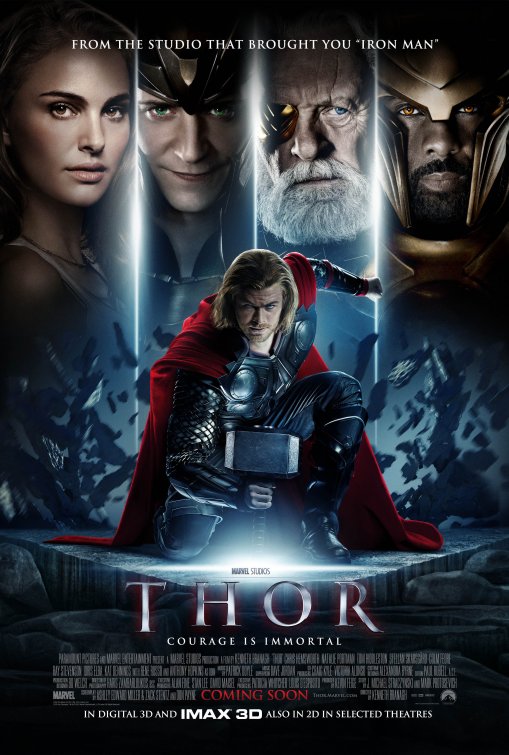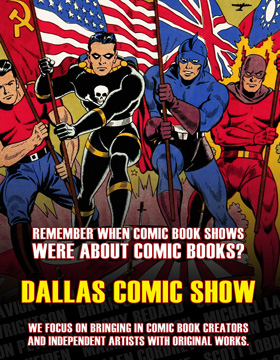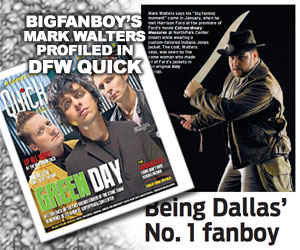It’s an interesting time we live in when comic book movies are at an all-time high in popularity and theater ticket sales, yet comic books are experiencing one of the worst times in sales history. This past Saturday, May 7, was Free Comic Book Day – where all over the United States in various comic book stores, you could walk in and grab yourself some free samples of what keeps hardcore fans comic back week after week, month after month. But the hard part is hooking new readers, and getting them to make comic shop visits a regular part of their routine. One could blame the economy, saying no one has three to five bucks to blow on a comic book these days, but movie tickets cost considerably more, and yet even with internet film pirating being out of control, the theaters are still getting solid numbers every weekend. Bringing us to THOR, which dominated its opening weekend by earning an estimated $66 million at the box office. I’ll come back to funnybooks in a minute. The movie had a reported budget of $150 million, but it’s already made more than that after opening early overseas (estimated international ticket sales are at $176 million!). These numbers are rather impressive, and bode well for upcoming Marvel adaptations like X-MEN FIRST CLASS and CAPTAIN AMERICA: THE FIRST AVENGER.
FAST FIVE came in second in its second weekend of release, bringing in an estimated $32.5 million. Other weekend openers JUMPING THE BROOM took in $13.7 million, and SOMETHING BORROWED took a little over $13 million. The Jodie Foster directed film THE BEAVER, starring Mel Gibson, only pulled in about $100, 000 (estimated) with a $4700 per screen average – in fairness, it was only playing on 22 screens, which is sad because it really is a good film… though hopefully it will get a wider release soon. The summer is looking pretty scary, with big-budget blockbusters hitting almost every weekend in June and July. BRIDESMAIDS and PRIEST open this coming weekend, with PIRATES OF THE CARIBBEAN: ON STRANGER TIDES opening in two weeks, followed by THE HANGOVER PART II in three weeks, so May still has plenty of big ticket items left before summer kicks into full swing.
But going back to my original point, we’ve got all sorts of comic book movies hitting in the next few years, many either filming now or currently in pre-production. This year alone has DC’s GREEN LANTERN, and Marvel’s X-MEN FIRST CLASS and CAPTAIN AMERICA: THE FIRST AVENGER, with next year bringing us Joss Whedon’s THE AVENGERS (if the script thief didn’t screw it up for everyone) along with Christopher Nolan’s THE DARK KNIGHT RISES and Zack Snyder’s SUPERMAN: MAN OF STEEL. Comic book movies are getting made, and getting money from moviegoers… so why not comic book stores? What’s the divide? How can people be so into superheroes on the big screen, but not on the printed page? A lot of this can be linked to the current status of bookstores. Popular chains like Borders have gone out of business left and right, and everyone is turning their reading habits to e-books, utilizing either a Kindle or an iPad. A week ago I had an interesting conversation with legendary horror writer Clive Barker (hang on while I pick up that name I dropped), and we specifically talked about the state of the comic book industry. Clive believes (and I’m inclined to agree) that the industry as a whole is ultimately going to have to destroy itself and rebuild in order to survive. E-books in a way are the rebuilding of the literary industry, with bookstore closings being the “destroy” part, but similar genres like the music industry are currently floundering as there’s no money in tangible product sales anymore. Musicians are having to either spend all their time on the road performing, or figuring out ways to merchandise themselves into profit.
How bad are comic sales? In January of this year, only one title sold over 100,000 copies (FANTASTIC FOUR, which featured a news-making storyline in which one of the leading characters died). At that time Marvel’s THOR sold under 43,000 copies. Millions of people will have seen the movie over the weekend, but less than 50,000 are buying the comic book. That’s sad. In the early 1990’s, during what is now referred to as the “speculator boom” (a time when people were buying comics hoping they’d shoot up in value), certain big titles were selling literally millions of copies a month, certain popular creators were making millions a year, and comic books were big business. These days, San Diego Comic-Con, the largest and longest-running comic book convention in the world, is getting something like 200,000 attendees and selling out tickets a half a year in advance. Sounds like comics are hot, right? No quite. That show has shifted its focus to the ‘media’ side of things, featuring big Hollywood studios and video game companies more prominently than the comic book creators that made it famous. It’s not a complete knock against them, it’s just the nature of the beast. I run a comic book show here in Dallas, and I know all too well how much of a necessary evil having media guests at a convention can be. Those names bring people through the door, even those who have never read a superhero title before… you just have to hope some of those people will leave being a newfound funnybook fan.
Looking at the comic book industry, and what’s been happening in the past few years, we’ve seen Warner Brothers put their executives into more controlling positions at DC Comics, and Disney buying out Marvel. The books are still hitting the shelves, but for how long? Production costs are high and sales are low. Certain smaller comic publishers are having to lower pay rates for creators, and in some cases setting a cap on what they will pay no matter how big the creator’s name is. What’s also not helping is the overage of unnecessary titles from the larger companies – do we really need four to six titles focused on the same character? Does a minor sidekick in a popular book really need their own title? My theory is the only surefire way for the comic industry to survive is to do some serious trimming of the fat, and that means cutting things down to the core group of titles, bringing things back to the way they used to be. Superman gets one book a month, so does Batman, and Spider-Man, and the X-Men. The way I see it, if I’m walking into a comic shop with ten bucks in my pocket, I can only afford two to three books, so don’t force me into a difficult process of choosing which two or three I’m gonna get. Put out a modest number of titles, utilizing the best creators you can find, and the industry will (hopefully) thrive once again. As much as I love seeing my favorite superheroes on the silver screen, I want to continue seeing them on the page. Now if you’ll excuse me, I’m going to break out some of my favorite Thor comics to celebrate The God of Thunder kicking box office butt.










Another issue has to be that comics themselves are moving in the direction where each issue is less story and more storyboard. In the golden age, you’d pick up a book and it would have 3-4 full stories. In the silver age, you’d pick up a book and it would have 1-2 full stories. In the bronze age, you’d pick up a book and it would have 1, 1/2 or 1/4th stories. These days sometimes you barely get a scene in each issue. I like the idea of heroes struggling with the idea of pulling the trigger and how much force to use when they do… but when that takes multiple issues it’s too long of a form for too short of a format.
Tell me the last time a Thor comic has as much story in it as the movie?
[Warning: Examples May Include Spoilers]
Coronation/ Break-In 1 issue ( lead out panel = Thor’s Plan )
Journey to Jotunheim/ Talk 1 issue ( lead out panel = First Punch )
Frost Giant Battle 1 issue ( lead out panel = Creature Awakens )
Retreat/ Chase 1 issue ( lead out panel = Odin Shows Up )
If we look at it critically there are probably 15-20 issues of story in that movie with modern issue pacing… and unless you’re bin diving for overdrafts you’re not going to get that much story for less then the cost of a theater ticket or blu-ray.
It’s not a knock against the writers or the artists because both are pushing the genre forward… but the direction they are pushing it is no longer a good fit for floppies. There’s nothing wrong with making a trade book or novel… but do that.
If you went to the theater and 5 minutes in the screen reads come back next month or go to some other theater for the next 5 minutes people would flip out. Why? because that’s not satisfying and would not meet our expectations for going to the movies. If it was an incentive… like serials in the old days, DC Showcase Shorts in the Extras, or post credit Marvel tie-ins… then that’s just going above and beyond… and fans love that. Free Comic Book Day works because single issues might as well be incentives… they sure aren’t being packaged as feature attractions.
I think one of the problems with Comics today is the giant summer tie-ins. “fear Itself”, “Skrull Invasion”, “Civil War”. It must be intimidating for a new reader to dive in when he or she has to buy 15 books just to staty current with that is going on in the Marvel Universe. Can we just get back to good stories that live in one book? Thank god Daredevil stays out of it, oh no wait “Shadowland!”
I also agree about trimming the fat. I mean how many Xmen comics do we need? I don’t even know which one to pick up anymore. And don’t get me started on Dead Pool!!!
Great points all round, but I do have to ask one question. I think it may have been an article in the Wall Street Journal that said ebooks contributed to 10% of the overall market last year and that was across all book stores, chain or independent. Is that enough to hobble an industry? Those sales are still contributing to the bottom line of the publishing industry.
I worked at the now defunct Lewisville Borders and look at figures like that and think that it shouldn’t have hurt us in the first place. We sold ebooks. You could get them from us just as easily as you could from anyone else. So, why were our customers not coming back as frequently? Well, the answer ties into the points that both of you (Mark and Mike) have made. The overall price of the product and the content.
Physical books have been going up in price, but why pay that price when I can buy the ebook for the price of a trade or mass market? Granted, I’m old school and love my paper (sorry, trees) so I continue to buy them when I can, but for other consumers, the ability to carry your entire library on a small electronic device wins and to be able to purchase a brand new title at a $7.99 to 12.99 price point is a bonus.
When it comes to comic books, I don’t want to have to spread my money over multiple story arcs to get the whole story. To get the complete Darkest Night story you had to invest quite a bit of money. Heck, there were times when I didn’t know which title was the actual story line and when it was a side story or another character’s story line. As you pointed out, I get comfortable with a character’s story and then, BAM, I’m given another story arc to pour money into and it just keeps going. So, as I’m updating my “About Me” page on my blog, I’ve decided to change my status from “comic book fan” to “comic book character fan” because I love the characters, just not collecting the books!
Bigfanboy should have more articles of interest like this. Maybe you call this “Mark’s Weekly Corner” or something.
And yes, I weep for the printed medium.